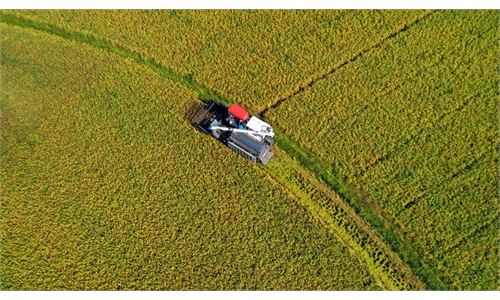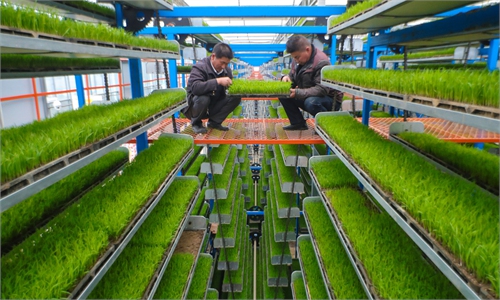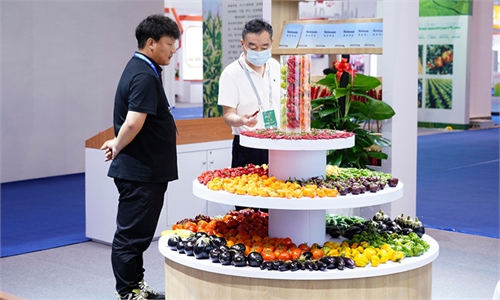Rise of China's 'Silicon Valley' for seeds highlights robust efforts to ensure food security
Nanfan shows China’s robust efforts to ensure food security
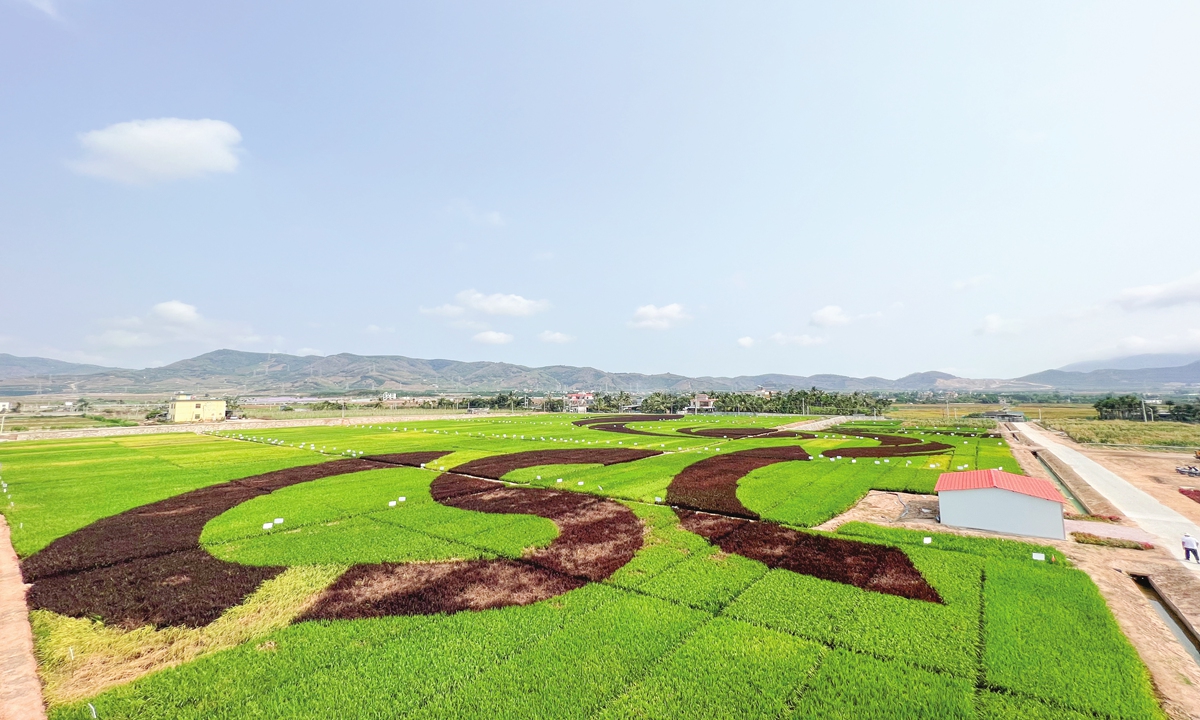
The Yazhou National Modern Agricultural (Seed Industry) Industrial Park in Sanya, South China's Hainan Province on April 2,2023 Photo:Wang Cong/GT
Sanya, a city in South China's Hainan Province, is known as a holiday paradise for both Chinese and foreign travelers. However, when Yuan Zhipeng arrived in the city in 2020, he didn't come for the beautiful beaches and resorts the city has to offer. He had a different mission in mind.
"I had a chance to come here and pursue a doctoral degree, so I did," Yuan, a PhD candidate at the seed science and technology research center of China Agricultural University, told the Global Times. "If all things go smoothly, I will graduate next year," he said with a cautious smile.
Yuan is among many Chinese scientists, students, and entrepreneurs who have come to Sanya to study and breed crop seeds with greater yields and better quality. Sanya has been known as a major base for Nanfan, a seed breeding process in South China's warmer climate, for decades. Currently, nearly 800 seed research institutions and enterprises and more than 8,000 researchers from 29 provinces, municipalities and regions are conducting Nanfan work in Hainan, according to official data. In the past 60 years or so, about 620,000 people in total have come to Hainan for Nanfan work, which has become essential for many major breakthroughs in China's seed industry, including the success of the hybrid rice. It contributes to more than 70 percent of the country's new agricultural seeds.
In recent years, amid growing global uncertainties and food security risks, Sanya has gained renewed significance as a major base for the seed industry, as the country mounted a full-fledged effort to step up research and development (R&D) in crop seeds to ensure food security. China is moving swiftly to build Sanya into a "Silicon Valley" for seeds, often dubbed the microchip of agricultural industry, to bolster the country's seed self-reliance and ensure food security.
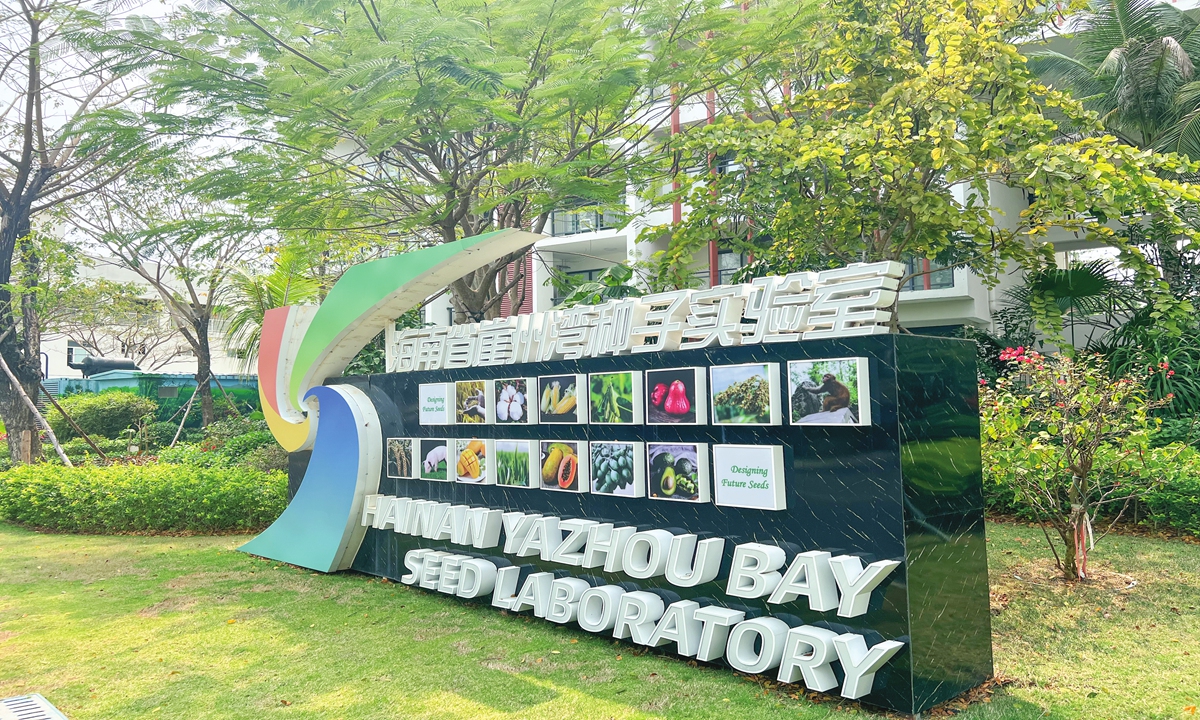
The Yazhou Bay Seed Laboratory in Sanya, South China's Hainan Province on April 2, 2023 Photo:Wang Cong/GT
Rapid progress
"In addition to the rapid completion of infrastructure and scientific research platforms, my biggest feeling is that the scientific research atmosphere is getting stronger, and the scientific research services are becoming more and more professional," Yuan said.
Such an atmosphere was palpable at the Yazhou Bay Seed Laboratory in Sanya. On a sunny Sunday afternoon, many young researchers were busy conducting experiments and other work inside a room packed with samples, boxes, and equipment. In the lobby, the works of the lab are shown to a busload of visitors. With visits by top Chinese officials, the lab has become a calling card for China's seed industry.
The mission of the lab is to focus on "meeting current pressing needs and seizing future high ground" in terms of seed R&D, Li Jiayang, a renowned agricultural scientist at the Chinese Academy of Sciences (CAS) and head of the lab, said at the China Seed Congress (CSC) and Nanfan Agricultural Silicon Valley Forum in Sanya last week. The lab is aiming for major breakthroughs in original and disruptive agricultural biology theories and building a new technology system for seedlings with independent intellectual property rights, Li said, while warning against food security risks.
In terms of grain supply, China's self-sufficiency ratio is 83 percent, which is well below the standard of 95 percent needed to ensure domestic food security, according to scientists at the CAS. "China is a vastly populous country, and relying on the international markets for food supplies is more difficult and more dangerous," said Chen Mengshan, head of the State Food and Nutrition Consultant Committee and a top CAS scientist.
Under such risks, R&D in seeds has become a crucial part of China's effort to ensure food security. In recent years, top policy documents repeatedly emphasized development in the seed industry. This year, both the No.1 central document and the Government Work Report stressed the need to invigorate the seed industry and strive to make key technological breakthroughs in agriculture.
China will soon release a master plan to further build the Nanfan Silicon Valley that integrates scientific research, production, sales, scientific and technological exchanges, and adoption of research results, and that serves the whole country, Zhang Xingwang, a vice minister of agriculture, said at the CSC.
"Because of its special climate conditions, Yazhou Bay and our seed breeding efforts here are an indispensable link" in boosting China's seed R&D, Yuan said, adding that the building of the Nanfan Silicon Valley provides crucial support and guarantees for seed R&D and scientific and technological exchanges.
The Yazhou Bay lab has 22 research teams led by top CAS scientists, and it had attracted more than 120 postdoctoral fellows and over 900 graduate students by the end of 2022, according to official data. Additionally, more infrastructure is still under construction to expand the local seed R&D facilities further. "The most common sight on the streets is that of big cranes," Yuan said.
The Yazhou National Modern Agricultural (Seed Industry) Industrial Park is part of the local effort to build a seed "Silicon Valley," attracting many research teams and enterprises to test new seeds and showcase the results to potential clients.
"Many have shown great interest in the park, as they have not been able to visit during the epidemic," Li Xiaobo, general manager of Hainan Nanfan Industry Development Co, which joined the building of the park, told the Global Times.
Zhang Xiaosheng, owner of the firm Biosow, is among the many firms that are conducting seed R&D at the park. Zhang said that some of the company's products, including chili peppers have reached globally leading levels and are even better than many foreign competitors, but continuous R&D is crucial. "Breeding is about probability, so continuous innovation is necessary," he told the Global Times.
For Yuan, continuous R&D is also a long-term mission.
"To ensure the food security of our country, seeds are very important," he said, noting that yield per unit area of China's seeds is not high enough, especially compared to some foreign countries. "Therefore, it is crucial to research for better, higher-yield seeds," Yuan said.

